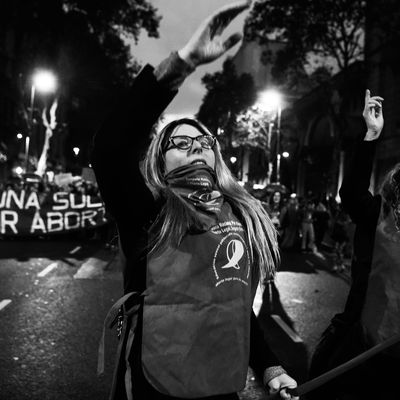
Less than a month after Ireland’s major abortion referendum, another country is considering legalizing the procedure: Argentina. On Wednesday, the lower house of Argentina’s congress will vote whether or not to legalize abortion in the first 14 weeks of pregnancy — a move that would be a major advancement in a region where abortion is typically criminalized.
Below, here’s what you need to know.
What are Argentina’s current abortion laws?
Short answer: It’s illegal. Women who undergo abortions can be jailed for up to four years, or even longer if the procedure was performed at a point when the fetus could have been deemed as viable outside the womb.
It’s not even legal in cases of rape or lethal threat to the mother’s body?
That’s when it’s technically legal. Women who have been raped or would suffer a potentially lethal pregnancy can get an abortion. However, Salil Shetty, the secretary general of Amnesty International, says that even women who could undergo the procedure legally often do not, because it’s difficult to find doctors willing to perform abortions.
“In practice, those exceptions are not actually honored, and what we see is a near total ban on abortions,” Shetty told the New York Times. Each year, according to Argentina’s National Ministry of Health, approximately 500,000 illegal abortions are performed in Argentina.
How did abortion rights end up on the ballot?
Argentina has seen a revitalized feminist movement that dates back to 2015, when 19-year-old Daiana García was killed and found on the side of the road in a burlap sack. Upset over the incident and the country’s high rate of femicide, 40,000 women marched onto Buenos Aires’ Congress, and a collective of women founded the anti-femicide Ni Una Menos movement. Many consider the fight to legalize abortion an outgrowth of a broader women’s rights movement that has grown since 2015.
According to annual polls conducted by Ipsos Public Affairs, public support for abortion rights has surged in the past year. In 2017, 27 percent of those polled said they support a woman’s right to abortion at any point during pregnancy, which jumped up to 39 percent in 2018.
More logistically speaking, President Mauricio Macri, who opposes legalizing abortion, told lawmakers in March that they could take up debate on the issue. He simply told them to “vote their conscience.” And, even though Macri is anti-abortion, he has said that he would not veto the bill if it passed.
Aside from obvious reasons, why would the enactment of this legislation be a big deal?
First of all, Argentina is Pope Francis’s homeland, and the Catholic Church opposes all abortions. Furthermore, very few countries in Latin America allow women to terminate their pregnancy without restrictions. Were Argentina to legalize the procedure, it would join Cuba, Uruguay, Guyana, and some parts of Mexico, according to the Times.
Is it expected to pass?
According to the Economist, the lower house vote is expected to be pretty close. However, even if the measure does pass, it will move on to the senate, where it is expected to be defeated. According to Argentinian gender-equality organization Economía Feminista, only 16 senators have spoken in favor of legalization, while 27 have stated that they are against the measure. Twenty-nine senators have not explicitly stated their stance.
But abortion-rights campaigners are hopeful, even if this measure sees defeat. Sabrina Cartabia, a pro-choice activist, told the Times that the legalization of abortion is “inevitable. The country has moved on.”




